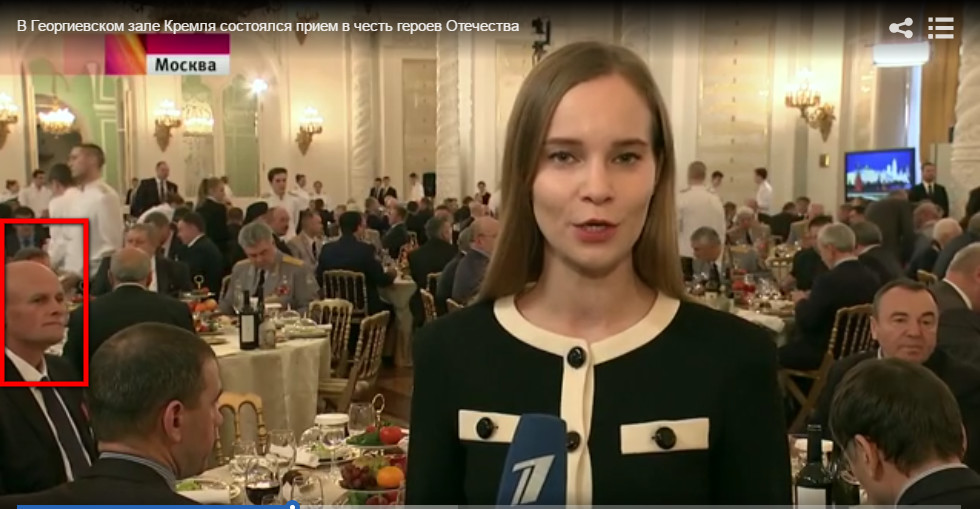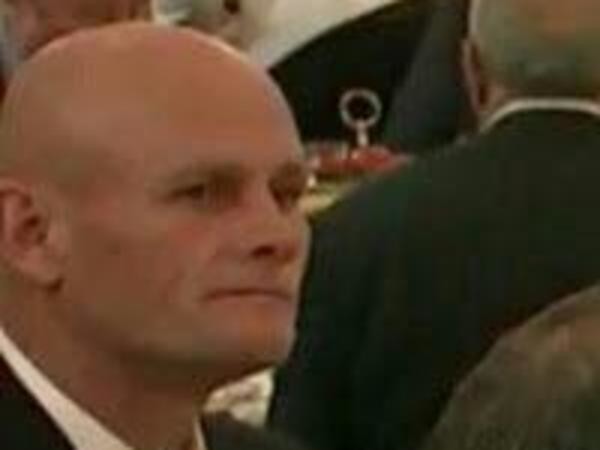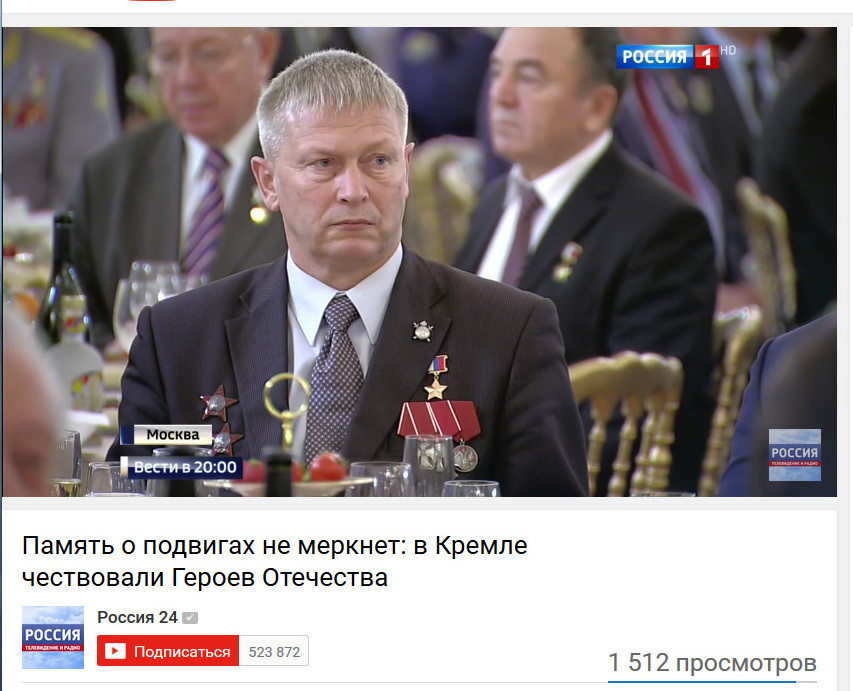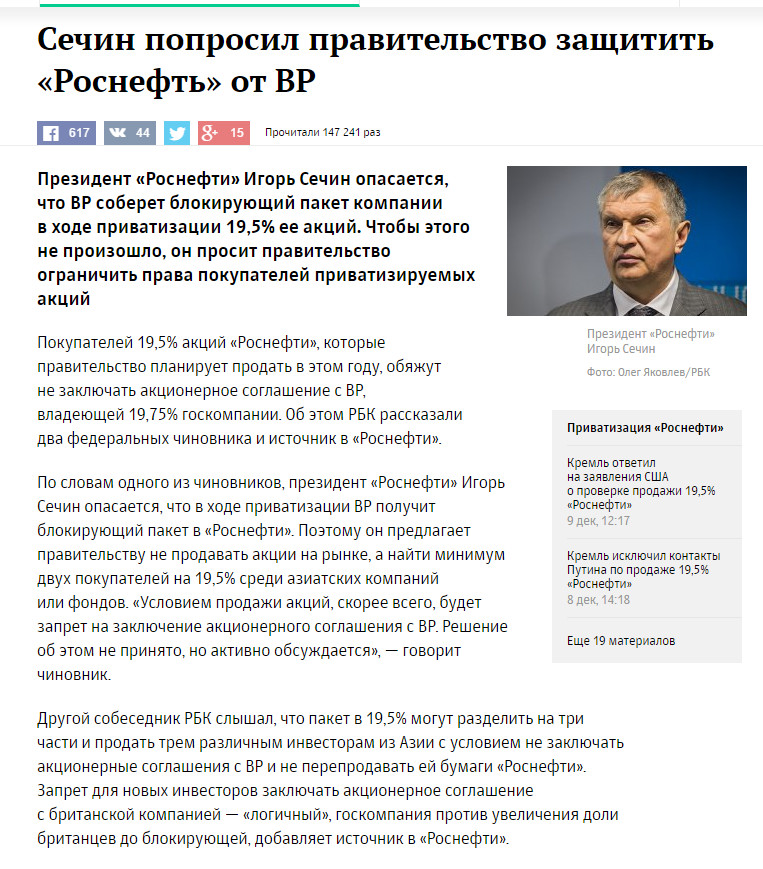LIVE UPDATES: A Russian judge in Moscow’s Arbitration Court ruled today in favor of Rosneft in its lawsuit against RBC for “business reputation damage,” but set the damages at only $6,684, not the $57.3 million that Rosneft had sought.
The previous issue is here.
Recent Analysis and Translations:
An In-Depth Examination Of Donald Trump’s Ties To Russia And Vladimir Putin
Anna Politkovskaya’s Last Interview to the Regional Russian Press On Day of Her Murder
‘The Dirty Deeds of the Pentagon in Syria’: An Example of Russian Propaganda
– What Has Ramzan Kadyrov Been Up To? Quietly Cultivating Regional and Kremlin Officials, Now He Meets with Putin
UPDATES BELOW

The St. Petersburg news site Fontanka reported today, December 12, that Dmitry “Wagner” Utkin, commander of the Wagner private military company named for his nom de guerre, as well as his deputy in the company, received gold stars at a Kremlin ceremony on December 9 for their role in capturing the ancient city of Palmyra from ISIS over the summer.
The irony is that ISIS re-took the city of Palmyra yesterday while Russian and Syrian-allied forces were busy storming Aleppo.
As The Interpreter has reported, Wagner has played a key role in Russia’s intervention in both Ukraine and Syria.
In addition to Utkin/Wagner, another figure about whom Fontanka has written in the past was present at the ceremony, as could be seen from footage on another state channel, Rossiya-1. He is Andrei Troshev, 54, a retired police colonel, spetsnaz veteran, a paratrooper gunner and veteran of the war in Afghanistan who had already twice been awarded the Red Star. Fontanka was unable to confirm that he had received an award for the storming of Palmyra. A graduate of Leningrad Artillery School, Troshev commanded an artillery battery in Afghanistan in the mid-1980s and then served in the St. Petersburg OMON (riot troops) and SOBR (rapid-reaction troops) in the North West. From the Channel One footage it can be seen that he has two Red Stars and two Orders of Courage and the Gold Star of the Hero of Russia.
Troshev retired from the command of the SOBR unit in the spring of 2014 and at that time did not have the Hero award, and police sources said presentation of one was not planned. Troshev also has another pin on his jacket — a burning grenade with two swords — but it is not known what this is.
— Catherine A. Fitzpatrick
President Vladimir Putin announced today at a meeting of a government commission on military and technical cooperation that in 2016, orders for exports of Russian armaments exceeded $50 billion, Gazeta reported, citing the Kremlin news site.
It is the second year running that Russia’s arms sales have increased.
Amnesty International reported in August 2016 that Russia was the second-larger exporter of conventional arms, totaling $42.4 billion. While the US is a greater exporter of weapons and was listed by Amnesty as selling $55 billion in weapons in the last year, Russia sells more weapons to conflict areas.
As can be seen from the UN’s registry of arms export records for Russia, sales went to Syria, Iran, Sudan, Turkey, Libya, Chad, Colombia, Egypt, and North Korea.
Putin also noted a global tendency to reduce military expenditures for economic reasons. In 2015, Russia delivered military products to 58 countries, although the number of partners in military and technical cooperation was more than 100. Putin commented:
“Recently, entire regions of the world are encountering the growth of violence and the terrorist threat. Examples are well known: this is Syria, Libya, Iraq, Afghanistan. We are prepared to offer purchasers the most advanced anti-terror means. This is not only close-combat equipment but military aviation, anti-aircraft systems, rocket artillery, armored vehicles.”
All of those countries were Soviet allies and today either have continued to receive armaments from Russia or expect to in the future.
Russia’s support of the regime of Syrian President Bashar al-Assad with more than $1 billion in arms is well known; less visible has been the resumption of Russian small-arms sales to Afghanistan as Russia has sought an expanded role following the draw-down of US troops. Iraq recently purchased attack helicopters from Russia. Russia is also prepared to supply Libya, where it has had extensive oil interests, with weapons when the arms embargo, imposed by the UN in 2011, is lifted.
Some of Russia’s bullets appear to have made it into the hands of ISIS, according to Damien Spleeters of Conflict Armament Research.
In his annual speech to the Federation Council, Putin claimed that this year, “agricultural produce exports yield Russia more than the sale of armaments” — a claim that seem to be driven by a need to show more diversity in the economy.
The business daily Kommersant said charitably that Putin’s statement was “a forecast for the time being,” i.e. not a current fact. (The first deputy minister of finance also reported in this vein that supposedly education would receive more funding than the military in Russia, a claim challenged by RBC.)
Yet Kommersant added that “with great likelihood,” the evidence to back up the claim will be secured in the year-end results through a growth in exports, particularly of grain, but “not the stabilization of export of arms.”
Given its boycott of foreign agricultural produce in retaliation against Western sanctions over Russia’s war on Ukraine, and the urgent need for food at home, it seems counterintuitive to see Russia exporting more food than weapons.
The increase this year could be due to new sales of S-300 anti-aircraft missiles to Iran, for example, although it is still unclear how many of these have been delivered, and for how much.
Another new source of revenue is Georgia. In July, the Kalashnikov factory announced that it had resumed delivery of civilian firearms to Georgia, after halting sales in 2006.
It may be that some arms sales are hidden so public reports of them may be understated. There are also giveaways, such as Russia’s gift to Serbia of fighter jets, announced by Belgrade today.
Serbian Foreign Minister Ivica Dacic said he would work out the transfer of arms on an upcoming trip to Moscow and said “lethal equipment” and “certain types of arms related to other types of forces.” He said Serbia and Russia were “strategic partners,” that no one could conceive of attacking Serbia without a response from from Serbia, and that “Belgrade would never conduct policy contrary to Moscow.”
— Catherine A. Fitzpatrick

According to RBC’s live blogging from the courtroom, a Russian Judge in Moscow’s Arbitrage Court today ruled in favor of Rosneft in its suit against the independent news service RBC over alleged “business reputation damages,” said to have stemmed from an article about Rosneft’s privatization quoting government officials who said the Kremlin wanted to keep BP from gaining any more shares.
But the judge only satisfied the plaintiff’s suit in part, however, because he ruled that the damages to be paid by RBC could only total 390,000 rubles ($6,389), and that each individual journalist involved also had to pay 4,500 rubles ($74). The judge also ordered the article in question to be removed from the web site within 10 days after the court decision went into effect, and also to publish a rebuttal.
Rosneft had shocked the media scene in Moscow with its demand for 3.5 billion rubles in damage ($57.3 million), an unprecedented sum for such cases or indeed any lawsuits in Russia.
Both sides can appeal the decision now twice more, to appelate courts. Even so, it is a significant victory that Rosneft could not prevail with a crippling lawsuit.
Since the lawsuit was launched in September, RBC has struggled for months to put together a defense against this overwhelming challenge, as we reported last week. Experts were too afraid to testify on their behalf, much less the government officials who were their original sources.
The offending article, titled “Sechin Asked Government to Protect Rosneft” can still be read online here but likely not for long.
It written by Timofey Dzyadko, Lyudmila Podobedova, and Maksim Tovkaylo. The journalists cite government sources who said that in the privatization of 19.5% of Rosneft’s stock, the Kremlin was asking prospective investors not to make any deals with BP which owns 19.75% of the stock. Supposedly fearing that a new shareholder could team up with BP to create a blocking number of shares, government officials insisted that at least two Asian companies or funds should buy the shares.
They also cite a BP representative in Moscow, Vladimir Buyanov, who told RBC that BP was “comfortable” with their existing 19.75% of shares, that more would be “impractical” and would “complicate” further deals with Rosneft as they would be “dependent.” Buyanov did not comment on the issue of whether the government had blocked BP from the sale.
Rosneft’s claims of “damage” seemed particularly far-fetched after last week’s news that the oil giant had successfully sold 19.5% of its shares to Glencore and Qatar, although it seems to have jumped the gun in describing the deal as finalized.
Igor Sechin, CEO of Rosneft, met with President Vladimir Putin to report on the successful deal; so much foreign currency will be paid that Putin asked that Rosneft convert the funds in stages so as not to upset Russian currency markets.
At today’s trial, RBC journalist Timofey Dzyadko represented RBC in court, along with his lawyer Yevgeny Reznik.
Journalists crammed into the small courtroom with some standing or sitting on the floor and RBC streamed a live-blog of the proceedings.
Dzyadko testified that the purpose of a 3.5 billion ruble lawsuit could only be to destroy his publication as that was far beyond its annual revenue.
Reznik asked for the trial to be postponed while the defense obtained responses from the government to prove their publication was truthful. The judge declined the request, saying he had enough material to judge the case.
RBC noted that the damages sought were unfounded and Dzyadko’s salary as a journalist was insufficient to pay it.
Rosneft said it sought “only 0.49% of the value of its business reputation” and insisted on keeping the sum. RBC pointed out that this meant that the value of Rosneft’s reputation was 635.8 billion rubles ($10 billion), but meanwhile in its annual report of 2015, its goodwill was valued at only 227 billion rubles ($3.7 billion). A Rosneft representative said the amount of the compensation had to be sufficient to deter a repeat of such damaging information.
Reznik says Rosneft was trying to cause material damage to RBC (translation by The Interpreter):“I don’t understand what we are accused of. The plaintiff’s demands are unfounded. What we have written in that article is the truth. Judging from the content of the Rosneft press release and the results of the meeting of the plaintiff with the president, we all see that our publication is the truth. None of the experts have found anything defamatory in the article that was on the site.”
Rosneft then clarified that the company’s goodwill was 217.7 billion rubles on the books, but its market value was more than 600 billion rubles. Rosneft’s representative said:
“The media must bear responsibility for the information it disseminates. It follows from RBC’s article that Sechin asked the government to protect him from BP. It cost us a great deal of effort to explain to BP that this wasn’t the case.”
RBC also testified that it had asked Mikhail Leontyev, press secretary of Rosneft, to comment on the claims by officials when the article was being prepared. This showed that RBC did everything it could to obtain a confirmation or denial of the claim before publication. RBC requested that Leontyev be summoned as a witness, but the judge dismisses the request, and also a request to show new evidence that Leontyev had been contacted.
Rosneft said that the respondents had cited figures of 30, 10 or 8 million rubles typical of similar suits but “what is 30 million rubles to such a global media company as RBC?”
Undeterred by the lawsuit, RBC ran a lengthy profile of Sechin today titled “Being Igor Sechin: Who Heads the Company Sueing RBC,” describing Rosneft as the most secretive and influential company in Russia.
RBC also posted Art. 29 from the Russian Constitution that states, “Freedom of the media is guaranteed. Censorship is prohibited.”
Translation: Today, BTW, is Constitution Day.
Today’s ruling was greeted as progress by the opposition and independent media, even given its inherent injustice:
Translation: A sign of the times: the court absolutely unlawfully sought damages from RBC of 390,000 in favor of Rosneft. Even so: oof…thank God…they got through it.
Navalny’s own court case, reopened due to a ruling of the Supreme Court, is in session today in Kirov but he has refused to attend.
Translation: 390,000 rubles instead of 3.9 billion in the current times looks almost like an acquittal. Although the decision even so was unjust, without a doubt.
Vladimir Varfolomeyev is the editor of Ekho Moskvy, often described as Russia’s last independent radio station.
— Catherine A. Fitzpatrick



